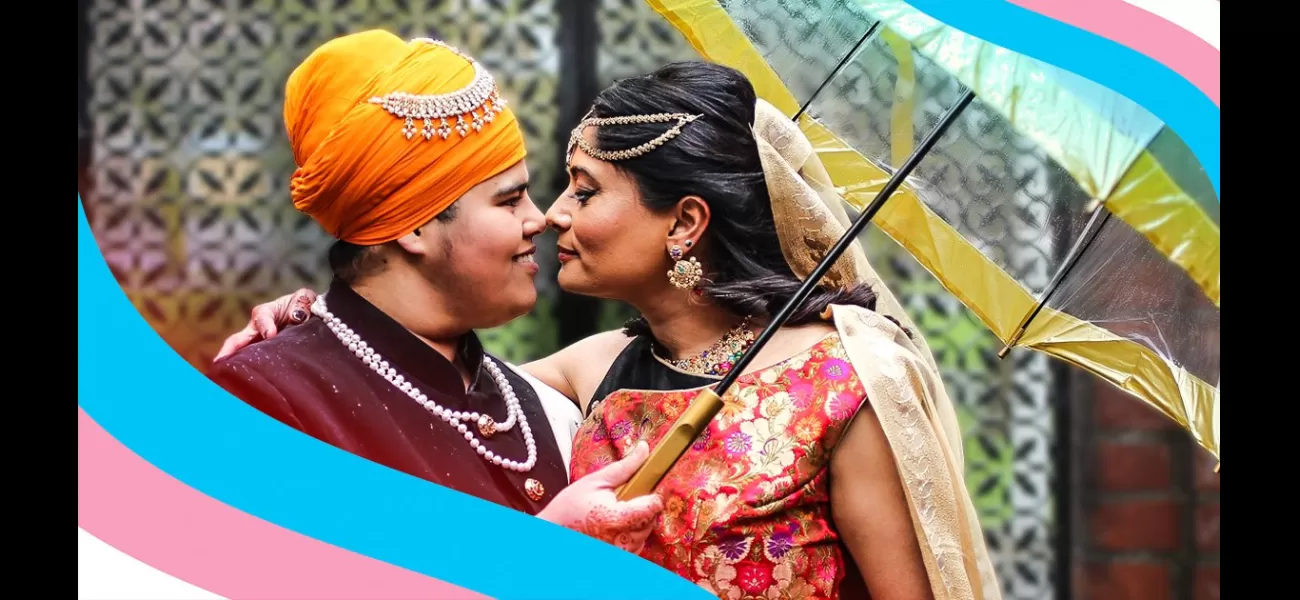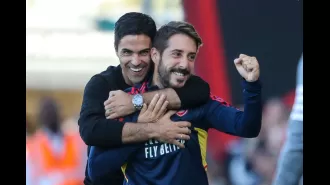My parents surprised me by showing up at my wedding celebrations.
I told my mom something while sitting on her bed.
July 28th 2024.

Angit and Joshna were happily planning their wedding, but there was one thing weighing heavily on their minds - whether or not Angit's parents would attend. As a queer Punjabi Sikh, Angit feared that his parents may not be fully accepting of his relationship with Joshna, a Hindu Gujarati pansexual woman. Despite the couple inviting them to their traditional pre-wedding ritual, called a mehndi, Angit and Joshna were unsure if their parents would feel comfortable attending.
But to their surprise and joy, Angit's parents showed up to the celebration. Overwhelmed with emotion, Angit couldn't help but cry, and he wasn't the only one - many of their friends and family were also in tears. Throughout the night, Angit's parents joined in on the celebrations and rituals, such as the Maiyan ceremony and the Jaggo, which made Angit feel incredibly grateful to have his future wife and parents all together in one room.
Growing up, Angit always felt like he didn't fit into the gender binary. In fact, he vividly remembers wearing a gingham school dress in first grade and feeling uncomfortable. However, he was fortunate to have parents who allowed him the freedom to express himself, playing with cars and motorcycles and wearing whatever he wanted.
As he got older, Angit discovered that he identified as non-binary, though he didn't have the vocabulary to describe it at the time. By the age of 14, he also realized that he was attracted to women, but was too afraid of being bullied to act on his feelings. He envied his openly lesbian classmates for their bravery, but it wasn't until he was 18 and in university that he began to explore his queer side, coming out to accepting friends and even finding a girlfriend through an online LGBTQ+ group for people of the Sikh faith called Sarbat.
At 24, Angit reached a point where he couldn't live a double life any longer and decided it was time to tell his mother about his sexuality. Though he was nervous and started crying before he could even say the words, his mother immediately hugged him and reassured him that it was okay and that God made him the way he is. She even suspected that he was gay, as his aunt had likely speculated as well. However, Angit was still too scared to tell his father, as they weren't as close as he was with his mother.
It wasn't until meeting Joshna in 2017, while both working at a hospital in London, that things began to change for Angit and his parents. Despite being from different religious backgrounds, Angit saw no barriers in their relationship. But when it came time for Joshna to meet Angit's parents, it was awkward and uncomfortable, with Joshna being introduced as just a friend.
In 2018, Angit decided to move to Canada and felt that he needed to tell his mother about his romantic relationship with Joshna, though he still couldn't bring himself to tell his father. His mother's reaction was a mixture of shock and disappointment, but she still attended Angit's going away party, where Joshna was also present. The tension was palpable and there was limited conversation between Joshna and Angit's mother, highlighting the discomfort and uncertainty in the air.
Despite the challenges and uncertainties, Angit and Joshna's love for each other and the support of their loved ones prevailed. They were grateful that Angit's parents were able to attend their wedding and celebrate their union, and they continue to navigate through their relationship with honesty and love.
Angit and Joshna were getting married the next day, and I was unsure if my parents would attend the celebration. My partner and I had organized a mehndi, a traditional pre-wedding ritual where we would have henna body art. We had invited my parents, but we weren't sure if they would feel comfortable being there because we weren't certain if they fully supported our union. You see, I am a queer Punjabi Sikh and my partner Joshna is a Hindu Gujarati pansexual woman.
To my surprise, I saw my parents walk in and I couldn't believe it. I was so shocked that I started to cry, and many of our friends and family members joined in. Throughout the night, my parents gradually became more involved in the celebrations and rituals. They participated in the Maiyan ceremony, where turmeric paste is applied to the skin, and even danced during the Jaggo, where an earthen pot with candles is placed on the head. It was truly a special moment to have my future wife and my parents in the same room celebrating with us.
Growing up, I always felt like I didn't fit into the gender binary. I remember in year one, I wore a gingham school dress and felt extremely uncomfortable. Thankfully, I had a lot of freedom to express myself. I played with cars and motorcycles, and I was able to wear whatever I wanted. I was often called a "tomboy" by others, and even my grandmothers would refer to me as a boy. If I had known the vocabulary we have access to now, I would have identified as non-binary.
By the time I was 14, I knew that I liked women. I had crushes on my classmates and even some of my teachers. But I was afraid to act on my feelings because I didn't want to be bullied. Some of my classmates were openly lesbian and they were often talked about and laughed at by other kids. Despite this, I envied their bravery. When I turned 18, I realized that my attraction to women was not just a phase. I had left sixth form and started university, and I wanted to explore this queer side of me. I slowly started to come out to some friends, who were all accepting and supportive.
It was during this time that I discovered an LGBTQ+ group online for people of the Sikh faith called Sarbat. I couldn't believe that something like this existed. I joined their website and discussion forum, and I started connecting with other LGBTQ+ individuals. I even met my first girlfriend through this group. By the time I was 24, I couldn't continue living a double life. I knew I had to tell my mom about my sexuality.
I sat on my mom's bed and told her that I had something important to share with her. But before I could even get the words out, I started to cry. She immediately hugged me and was worried about what was wrong. Through tears, I blurted out, "Mom, I don't like men, I like women." Despite being in shock, she kept hugging me and eventually told me that it was okay and that God had made me this way. She even revealed that she had a feeling about it in the past, possibly because my aunt had speculated on it. I didn't tell my dad at the time because I was scared of his reaction, and we weren't as close as my mom and I.
In 2017, I met Joshna while working at a hospital in London. We hit it off and sparks flew. Even though she was Hindu and I was Sikh, it didn't matter to me. However, when it came to introducing Joshna to my parents, it was a bit awkward. She first met my mom as my "friend" at a Navratri event in 2017. In 2018, I made the decision to move to Canada and I knew I had to tell my mom about my romantic relationship with Joshna. Her initial reaction was a mix of shock and disappointment.
At my going away party, Joshna was there and we could sense that my mom didn't know how to react. There was very limited conversation between the two of them, and it was clear that there was some discomfort. But despite all of this, Joshna and I are happily married now and my parents have fully accepted our relationship. We are grateful to have each other and the love and support of our families.
But to their surprise and joy, Angit's parents showed up to the celebration. Overwhelmed with emotion, Angit couldn't help but cry, and he wasn't the only one - many of their friends and family were also in tears. Throughout the night, Angit's parents joined in on the celebrations and rituals, such as the Maiyan ceremony and the Jaggo, which made Angit feel incredibly grateful to have his future wife and parents all together in one room.
Growing up, Angit always felt like he didn't fit into the gender binary. In fact, he vividly remembers wearing a gingham school dress in first grade and feeling uncomfortable. However, he was fortunate to have parents who allowed him the freedom to express himself, playing with cars and motorcycles and wearing whatever he wanted.
As he got older, Angit discovered that he identified as non-binary, though he didn't have the vocabulary to describe it at the time. By the age of 14, he also realized that he was attracted to women, but was too afraid of being bullied to act on his feelings. He envied his openly lesbian classmates for their bravery, but it wasn't until he was 18 and in university that he began to explore his queer side, coming out to accepting friends and even finding a girlfriend through an online LGBTQ+ group for people of the Sikh faith called Sarbat.
At 24, Angit reached a point where he couldn't live a double life any longer and decided it was time to tell his mother about his sexuality. Though he was nervous and started crying before he could even say the words, his mother immediately hugged him and reassured him that it was okay and that God made him the way he is. She even suspected that he was gay, as his aunt had likely speculated as well. However, Angit was still too scared to tell his father, as they weren't as close as he was with his mother.
It wasn't until meeting Joshna in 2017, while both working at a hospital in London, that things began to change for Angit and his parents. Despite being from different religious backgrounds, Angit saw no barriers in their relationship. But when it came time for Joshna to meet Angit's parents, it was awkward and uncomfortable, with Joshna being introduced as just a friend.
In 2018, Angit decided to move to Canada and felt that he needed to tell his mother about his romantic relationship with Joshna, though he still couldn't bring himself to tell his father. His mother's reaction was a mixture of shock and disappointment, but she still attended Angit's going away party, where Joshna was also present. The tension was palpable and there was limited conversation between Joshna and Angit's mother, highlighting the discomfort and uncertainty in the air.
Despite the challenges and uncertainties, Angit and Joshna's love for each other and the support of their loved ones prevailed. They were grateful that Angit's parents were able to attend their wedding and celebrate their union, and they continue to navigate through their relationship with honesty and love.
Angit and Joshna were getting married the next day, and I was unsure if my parents would attend the celebration. My partner and I had organized a mehndi, a traditional pre-wedding ritual where we would have henna body art. We had invited my parents, but we weren't sure if they would feel comfortable being there because we weren't certain if they fully supported our union. You see, I am a queer Punjabi Sikh and my partner Joshna is a Hindu Gujarati pansexual woman.
To my surprise, I saw my parents walk in and I couldn't believe it. I was so shocked that I started to cry, and many of our friends and family members joined in. Throughout the night, my parents gradually became more involved in the celebrations and rituals. They participated in the Maiyan ceremony, where turmeric paste is applied to the skin, and even danced during the Jaggo, where an earthen pot with candles is placed on the head. It was truly a special moment to have my future wife and my parents in the same room celebrating with us.
Growing up, I always felt like I didn't fit into the gender binary. I remember in year one, I wore a gingham school dress and felt extremely uncomfortable. Thankfully, I had a lot of freedom to express myself. I played with cars and motorcycles, and I was able to wear whatever I wanted. I was often called a "tomboy" by others, and even my grandmothers would refer to me as a boy. If I had known the vocabulary we have access to now, I would have identified as non-binary.
By the time I was 14, I knew that I liked women. I had crushes on my classmates and even some of my teachers. But I was afraid to act on my feelings because I didn't want to be bullied. Some of my classmates were openly lesbian and they were often talked about and laughed at by other kids. Despite this, I envied their bravery. When I turned 18, I realized that my attraction to women was not just a phase. I had left sixth form and started university, and I wanted to explore this queer side of me. I slowly started to come out to some friends, who were all accepting and supportive.
It was during this time that I discovered an LGBTQ+ group online for people of the Sikh faith called Sarbat. I couldn't believe that something like this existed. I joined their website and discussion forum, and I started connecting with other LGBTQ+ individuals. I even met my first girlfriend through this group. By the time I was 24, I couldn't continue living a double life. I knew I had to tell my mom about my sexuality.
I sat on my mom's bed and told her that I had something important to share with her. But before I could even get the words out, I started to cry. She immediately hugged me and was worried about what was wrong. Through tears, I blurted out, "Mom, I don't like men, I like women." Despite being in shock, she kept hugging me and eventually told me that it was okay and that God had made me this way. She even revealed that she had a feeling about it in the past, possibly because my aunt had speculated on it. I didn't tell my dad at the time because I was scared of his reaction, and we weren't as close as my mom and I.
In 2017, I met Joshna while working at a hospital in London. We hit it off and sparks flew. Even though she was Hindu and I was Sikh, it didn't matter to me. However, when it came to introducing Joshna to my parents, it was a bit awkward. She first met my mom as my "friend" at a Navratri event in 2017. In 2018, I made the decision to move to Canada and I knew I had to tell my mom about my romantic relationship with Joshna. Her initial reaction was a mix of shock and disappointment.
At my going away party, Joshna was there and we could sense that my mom didn't know how to react. There was very limited conversation between the two of them, and it was clear that there was some discomfort. But despite all of this, Joshna and I are happily married now and my parents have fully accepted our relationship. We are grateful to have each other and the love and support of our families.
[This article has been trending online recently and has been generated with AI. Your feed is customized.]
[Generative AI is experimental.]
0
0
Submit Comment





